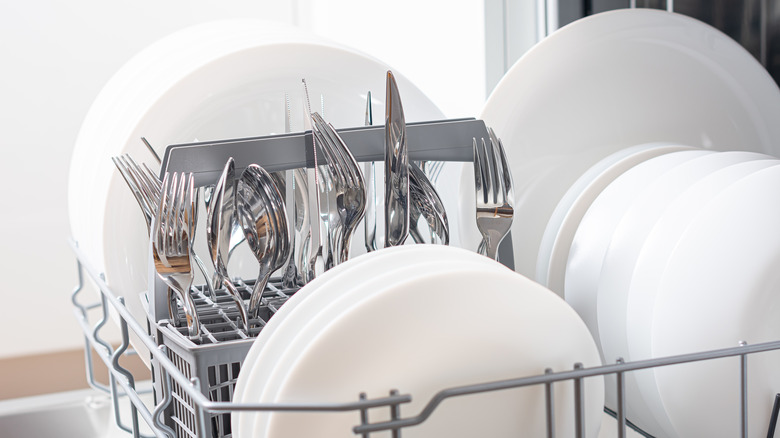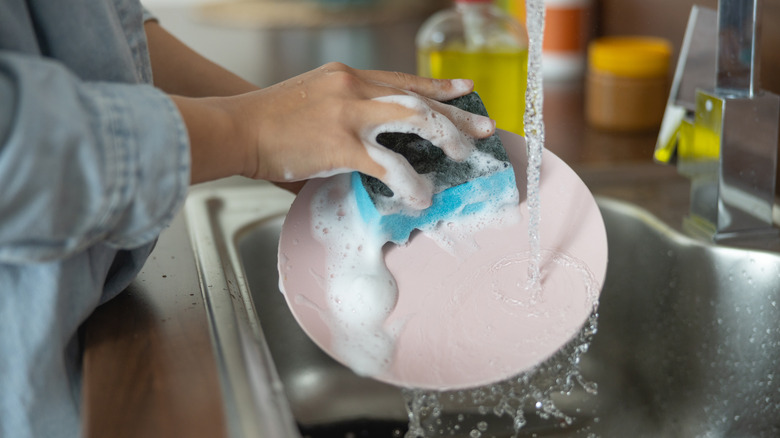Is Hot Water Actually Better For Dish Washing?
You've probably heard that you should never wash dishes in cold water. However, with the impulse to complete the chore as comfortably as possible, combined with the desire to keep energy costs down and save water, the debate of whether to use hot or cold water when washing up after family meals continues to pique the interest of homeowners today. While both options are undoubtedly feasible methods for getting the job done, one outweighs the other for its ability to save time and effort in doing so. When it comes to washing dishes, hot water usually offers a quicker and more effective clean than lukewarm or cold water, whether completing the task by hand or using a machine.
Some may argue that the temperature of the water used when dishwashing has little impact on the outcome of the chore, claiming that the cleaning power of dish detergent is enough to finish the job effectively. It's true that dishwashing liquid plays an important role throughout the dish cleaning process, but while cleaning with cold water is entirely possible, there are benefits of washing dishes with hot water. Doing so may allow you to maintain a healthier home and a more sanitary kitchen.
Hot water kills bacteria
Hot water is generally preferred over water set at colder temperatures when washing dishes because the added heat does a better job of destroying harmful microbes that may linger on your crockery and cutlery after use. Leaving bits of food particles on your dishes for extended periods of time due to improper washing habits can allow bacteria to multiply, turning your kitchen into an unsafe space to cook and eat. Handling dishes and utensils with unclean fingers also helps the transfer of dangerous types of bacteria around your kitchen, which may bring serious illness upon yourself or your family members if consumed. The temperature of water needed to kill bacteria is 149-degrees Fahrenheit, a temperature much too hot for human hands to handle. So in that regard, washing dishes by hand in general, no matter the temperature of the water used to do so, isn't entirely effective.
Dishwashers, however, are designed to clean dishes at notoriously high temperatures, with the appliances washing their contents in a main cycle that sees temperatures up to 145-degrees Fahrenheit, followed by a final rinse that reaches temperatures as high as 155-degrees Fahrenheit. In other words, using a dishwasher with a high temperature setting takes your dish cleaning routine another step further by sanitizing the plates, bowls, and cups inside throughout its cycle before they're dried and stored for future use.
Hot water makes degreasing easier
Not only does hotter water sanitize dishes through washing, but it also makes the cleaning process easier and takes less time to tackle stubborn grease and grime that may be left over from cooking and eating. Even without detergent, hot water can melt away the solidified fats that congeal on your dishes as they sit and cool over time. But combined with dish soap, hot water can lift tough stains at an even faster rate, using a blend of enzymes, surface-active agents, and other additives to break down fats and oils on dirty dishes and make them easier to wash away with clean water. Soaking or rinsing your dishes before placing them in the dishwasher isn't necessary, but it can help loosen any difficult food debris. A 15- to 30-minute soak in hot, detergent-mixed water will release many hard-to-tackle stains, but some stuck-on grime may take a few hours of soaking or even all night to release.
Using cold water paired with an appropriate detergent to clean your dishes is also an option, but this combination may require more time to get the job done, along with more scrubbing power to lift residue once the dishes are finished soaking. Also, keep in mind that standard dishwashing liquids don't sanitize dishes in the same way that high-temperature water does. So, if you're looking for the healthiest method by which to clean your dishes, the dishwasher with hot water is the way to go.


